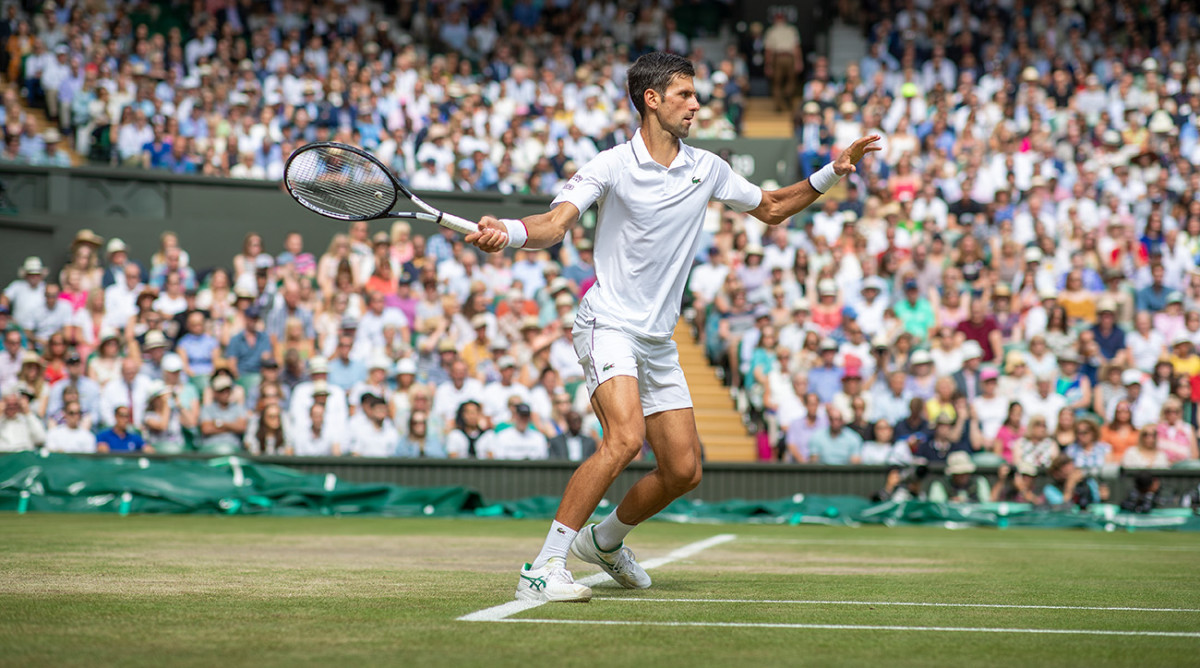How Djokovic's Mental Training Helped Him at Wimbledon | Beyond the Baseline Podcast

On the latest edition of the Beyond the Baseline Podcast, host Jon Wertheim sits down with former player and current commentator Robbie Koenig to discuss the impact and lessons learned from Wimbledon 2019, including what makes Novak Djokovic so great; how Roger Federer is feeling after losing in the final; the dominance of the Big Three; Serena Williams's career; and much more.
Listen to the Beyond the Baseline podcast here and subscribe to the podcast on iTunes or on Stitcher. The following transcript has been edited and condensed for clarity.
Jon Wertheim: What did you learn about Novak Djokovic a week ago Sunday?
Robbie Koenig: I learned that this guy didn't even play his very best tennis in the final. It's going to be very difficult to beat him in the next three or four years. It wasn’t the best Djokovic that we’ve seen—we saw the best Djokovic in the finals of the Australian Open. Of course, you've got to take into consideration who's on the other side of the net and that it’s Federer’s favorite surface. But I think the fact that Djokovic can still win not playing his best, playing it you know 80-85%, just is going to make it very difficult for the rest of the field to beat him at the majors. And it's almost like they need an extreme scenario like we saw unfold at the French Open in order for him to lose.
He is so clutch mentally. It sure showed us how strong he is mentally. It was really an affirmation of everything Novak is all about. The ability for the last eight years to be the dominant force, whether he’s playing well or not, against two of the greatest players to ever play the game.
Mentally, we learned a lot about him in this post-match press conference. There were some very interesting things that were said. He spoke a lot about visualization and how, in his mind, he turned everything around when the chants were for Roger’s name. He visualizes it and heard it being Novak's name. And of course everybody in the press room laughed—not him though. Because he knows how important that was to his success and he knows how important it is to be strong mentally. You get the sense that he works on it on a daily basis. I think in a lot of sports, sportsmen and sportswomen think about the importance of being tough mentally. But how many actually practice visualization and mental training on a daily basis? I get the sense that he does.
JW: You are stealing all my lines. I am so with you on this. And I think that a few years ago he spoke about visualization and self-actualization, and the whole peace and love phase, and the guru and everybody sort of giggled. Sports and psychology as an overlap still has a ways to go. I feel like gradually he is showing and I think that that bit you said—that's a concrete example. But I feel as though one of Novak's legacies is going to be that he has not just taken the stigma off of all of this mental health and on all of this sort of the spiritual component to sports, but the results kind of speak for themselves. I mean you giggle all you want it you know health and wellness and some of his tweets seem a little sort of touchy-feely and a little bit out there. But I think that’s fine and I think you're absolutely right. And I think that he gave that concrete example of here hearing the crowd cheering for him when you and I both know it was probably 95.5% for the other guy. I think this is really significant, not just in his career, but I think this is gonna be one of his real legacies. That he that he did not reinvent tennis, he didn't serve differently. It's not like Nadal who brought a completely different geometry and sensibility to the sport. But I think this whole business of mental health is going to be really part of Djokovic his tennis legacy.
Subscribe to get all new episodes of Beyond the Baseline for free.
RK: True, true. I enjoy reading a lot of psychology books and you know they talk about it as the principle of universal energy. And you know he talks about energy and all that sort of stuff. And he is able to connect with that. It's very interesting I had long chat with Gebhard Gritsch, who is his physical trainer. You know, he doesn't like to do anything in a gym. Little time as possible in a gym. He likes to be outdoors. Everything has to be structured outdoors—upper body exercises will be things like canoeing. He likes to do a lot of running without shoes on feel the earth beneath his feet. Riding a bike up a hill rather than doing a stationary bike in a gym.
So he does everything that he possibly can to embrace and connect with the power that he that he and many psychologists call universal energy. In a small way I had that when I came back from injury as a 22-year-old and started reading many different books about it. And you know what, I couldn't believe the difference it made to my game on a small scale. And I wasn't as disciplined as this guy. I had a bit of success for six months and I kind of forgot about it. So when you've got somebody who is so dedicated to mental training—and we all speak about it but he actually does it—I'm not surprised that he gets the results that he gets. Some people might call it luck. Call it whatever you want surviving these match points, got a little lucky. But he's got lucky too often for it to be luck.





